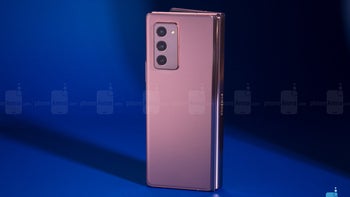The Galaxy Z Fold 2 has the smallest curvature of any foldable phone

The Samsung Galaxy Z Fold 2 is a substantial improvement over the company's first bendable phone, thanks to improved specs and a sturdier design. It will go on sale this Friday and ahead of the release, the South Korean giant has revealed some interesting facts about its display.
Unlike the OG fold, the new device doesn't feature a polyamide plastic layer. Rather, the screen is protected by Ultra-Thin Glass. Samsung today said that the Galaxy Z Fold 2 also has the smallest curvature of any foldable phone.
A display panel is made up of various layers and when you fold it, you put it under stress. And it gets even more complicated. The front side of the panel goes through contraction stress and the backside faces extension stress and these opposing forces are collectively known as folding stress.
Folding stress has an indirect relationship with the curvature rate of a display panel. In simple words, folding stress increases as the degree of curvature becomes smaller. The smaller the curvature radius, the more the screen can be folded. A tight curvature also decreases the folding gap.
The Galaxy Fold and Z Flip feature screens with a 1.5R curvature. Samsung has managed to reduce that with the Galaxy Z Fold 2, which has a 1.4R rating for its curvature. This means that the curvature of the panel, when folded, is the same as that of a circle with a radius of 1.4mm.
To minimize folding stress, Samsung has optimized different display elements such as its material, design, and module assembly.
Thanks to this technological breakthrough, Samsung says the phone can withstand 200,000 folds.
Galaxy Z Fold 2 also has the lowest level of blue light emission
Galaxy Z Fold 2's panel has also bagged “Eye Care Display” certification for its blue light emission level of 6.5 percent, the lowest in the industry at the moment.
The device also features the company's Adaptive Frequency display technology, which means the refresh rate is calibrated according to app requirements, resulting in power efficiency. It can go as high as 120Hz when playing games and drop to 10Hz for static content. Per display specialist Ross Young, the rate can go as low as 1Hz.










Things that are NOT allowed: